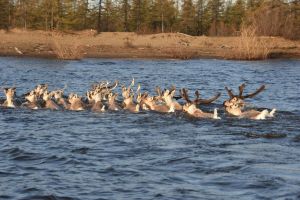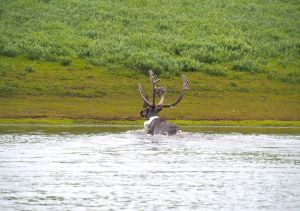Please activate JavaScript in your browser to use all interface options.
- About Rosneft
- Corporate governance
-
Business
Upstream
- General Information
- Licensing
- Geological Exploration
- Reserves and resources
- Production and Development
- Gas Business
- Offshore projects
- Offshore equipment
Downstream
- Petroleum refining
- Gas Processing
- Petrochemistry
- Catalyst plants
- Production of lubricants
- Sales of oil products
- Sales of Petrochemical products and LPG
- Gas Sales
- Gas Motor Fuel Sales
-
For Investors and Shareholders
- Corporate documents
- Financial statements, presentations, annual reports
- LSE RNS disclosure
- Investor calendar
- Rosneft: Contributing to Implementation of UN Sustainable Development Goals
- ESG
- Equity
- For Insiders
- Shareholder’s Personal Account
- General shareholders' meeting
- Dividends
- Questions and answers for shareholders
- Investor tools
- Contacts
- Beware of fraud!
- Sustainable Development
- News room
Rosneft Conducts Wild Reindeer Research in Western Taimyr
20 August 2025
A scientific expedition to study wild reindeer has been completed in Western Taimyr with Rosneft's support, conducted as part of the corporate environmental programme Tamura. Scientists from Siberian Federal University (SFU) travelled approximately 2,500 kilometres by boat along the Pyasina River, over 1,500 kilometres on a radial route along the Dudypta, Tareya and Pura rivers, as well as more than 700 kilometres along the Khatanga and Kheta rivers.
The primary objective of this year's wild reindeer research was to count the population and assess the distribution of animals in Western Taimyr using instrumental and ground-based observation methods. Annual monitoring of bio-indicator animals provides a comprehensive understanding of how climate change affects Arctic ecosystem condition.
During boat and stationary observations, scientists conducted photo and video recording of deer. The collected data will be processed during office-based work using specialised computer programmes. To determine migration routes, specialists fitted GPS transmitters to several individual reindeer. Following the expedition, scientists also noted the appearance of large herds, predominantly male, on the right bank of the Pyasina.
Rosneft has been studying wild reindeer since 2014. During this time, comprehensive ground and aerial surveys of the animals have been conducted in Evenkia and Taimyr. The scientists utilized satellite tags to track the full annual migration cycle of reindeer, enabling the first-ever identification of seasonal behavioral patterns.
 Rosneft pays special attention to environmental issues and biodiversity conservation, implementing the most extensive Arctic research programme since Soviet times. Under the Tamura programme, launched in 2024, scientists plan to update information on the status of key animal species in the northern region.
Rosneft pays special attention to environmental issues and biodiversity conservation, implementing the most extensive Arctic research programme since Soviet times. Under the Tamura programme, launched in 2024, scientists plan to update information on the status of key animal species in the northern region.
Tamura involves studying the Kara Sea polar bear subpopulation, wild reindeer populations in Western Taimyr, and valuable bird and fish species in the Yenisei estuary. The data obtained will enable scientists to draw conclusions about ecosystem conditions and develop measures for regional biodiversity conservation. The programme will run until 2027. In 2025, scientists have already conducted three expeditions to study the Kara Sea polar bear subpopulation, with a total of ten expeditions planned over four years.
Department of Information and Advertising
Rosneft
August 20, 2025
Keywords: Environmental news 2025

-315xx70.png)

